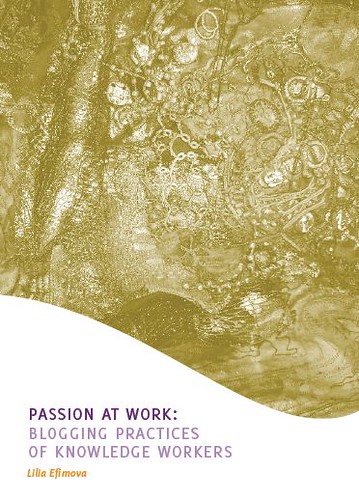 After a brief hiatus due to leaving the book on an airplane (and almost doing it a second time), I have finished Lilia Efimova's PhD thesis, Passion at Work: Blogging Practices of Knowledge Workers, and the words are still familiar from reading her material over the years. It is a very readable study of blogs as tools for personal knowledge management and the larger implications for organizations and individuals.
After a brief hiatus due to leaving the book on an airplane (and almost doing it a second time), I have finished Lilia Efimova's PhD thesis, Passion at Work: Blogging Practices of Knowledge Workers, and the words are still familiar from reading her material over the years. It is a very readable study of blogs as tools for personal knowledge management and the larger implications for organizations and individuals.
As with my view from a couple weeks ago, these sections inspire a lot of reflection on my own practices. Mainly, wondering how closely my experiences fit with those reported by other bloggers. I find that I relate to many of the "km bloggers" experiences - experiences of those who are blogging publicly, primarily as a vehicle for their own self-expression. It also left me wondering in thinking about the experiences of bloggers at Microsoft.
Chapter 5 dealt KM bloggers and their experiences around their blogs as a means of meeting and interacting with other people. I particularly liked (and recall when it was first discussed) the idea that blogs offer people a personal glimpse and connection that doesn't come through in formal communication channels. When I went into product management two years ago, I made a concerted effort to find and connect with other product management bloggers, which helped me to get a bigger sense of the role. But when I left product management, I didn't feel strongly inclined to continue following those bloggers.
I also see that today things like Twitter don't offer the same level of intimacy. In Twitter, my connections may be more obvious, but everything people say seems to have the same level of importance: it's all superficial. "It's all a miasma" view of the person, as described by Euan Semple. In a blog, the things that are important - the things that make people interesting - are much more obvious. It's much easier to present and control the image presented in a blog. But then, I don't think I would have time to pick up and read blogs from these connections on a regular basis. One other thought along the lines of the thesis, does Twitter provide the same kind of "Google juice" as blogging?
The chapter on Lilia's research of bloggers at Microsoft was newest to me. I either hadn't read the results of that work as closely, or the thesis put it together in a new way that hadn't come across before. The varied ways in which blogging is/was supported within Microsoft should sound familiar, if you've been following the topic of blogging and social media in general within enterprises. My main thought on reading this section is whether people are doing much with blogging in the enterprise anymore. There is certainly lots of energy around Enterprise 2.0, which emphasizes the use of a wide variety of technologies, but not so much blogging specifically.
The final chapter does a nice job of summarizing and drawing together the many threads of Lilia's thesis. As Lilia gets back into the swing of her own work and blogging after this thesis effort, I am curious to see what comes next. (I think she is too.)
[Photo: Cover art for Lilia's thesis, as posted to Flickr]